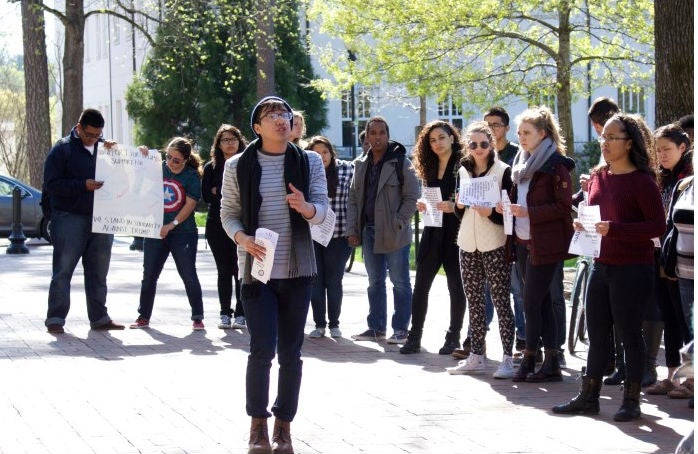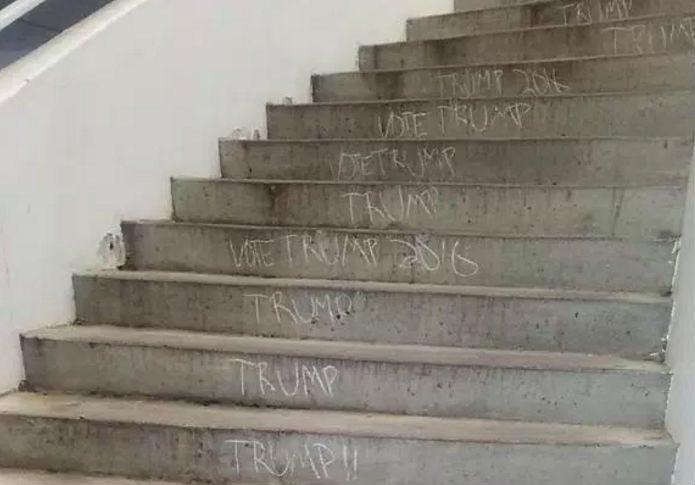Emory University president says students are in 'fear and pain' after pro-Trump chalk messages appear on campus
President James Wagner has met with students following a 50-strong demonstration

Your support helps us to tell the story
From reproductive rights to climate change to Big Tech, The Independent is on the ground when the story is developing. Whether it's investigating the financials of Elon Musk's pro-Trump PAC or producing our latest documentary, 'The A Word', which shines a light on the American women fighting for reproductive rights, we know how important it is to parse out the facts from the messaging.
At such a critical moment in US history, we need reporters on the ground. Your donation allows us to keep sending journalists to speak to both sides of the story.
The Independent is trusted by Americans across the entire political spectrum. And unlike many other quality news outlets, we choose not to lock Americans out of our reporting and analysis with paywalls. We believe quality journalism should be available to everyone, paid for by those who can afford it.
Your support makes all the difference.An Atlanta University’s president is scrambling to appease students who have been protesting against pro-Donald Trump graffiti around campus.
Scrawls in chalk on Emory University campus grounds and on buildings in support of the Republican’s presidential campaign have reportedly frightened students and spurred a 50-strong demonstration.
Students viewed the messages as intimidation and expressed “genuine concern and pain” as a result, according to president James Wagner, who wrote a letter about the event this week.
Students saw the messages in chalk - such as “Trump 2016” and “Build a Wall” - and “heard a message about values regarding diversity and respect that clash with Emory's own,” Mr Wagner wrote in a letter that was obtained by Associated Press.
Jonathan Peraza, 19, of Latino heritage, told AP: “That is a direct reference to brown people on campus,” and added that ”we feel unsafe on our campus.”
He claimed he received a death threat following the protest and forwarded the threat to the administrator team at the University.

“It was an intentional way to rile students up and intimidate those of us who feel we are in danger with this presidential candidate,” he added. ”We do feel that our lives are in danger with his campaign and the violence that he's been inciting.”
Other students said they were frustrated by the rhetoric and lack of action from the University officials, and said they would have acted quicker if the graffiti had been in support of Hitler.
“I legitimately feared for my life,” Paula Camila Alarcon, a Latino first year told The Daily Beast. “I thought we were having a KKK rally on campus.”
The University asked the FBI to investigate a case in October 2014 where people drew swastikas on a historically Jewish fraternity building.
Mr Wagner, who is stepping down this year, agreed to meet the students after the protest, during which they called out: “You are not listening! Come speak to us, we are in pain!”
Mr Wagner plans to implement several policy changes, including “bias incident reporting and response procedure” and to provide regular opportunities for “difficult dialogues”.
Students have handed out "#StopTrump2016” fliers and have tried to scrub the chalk messages.
The student newspaper, The Emory Wheel, reported that Mr Wagner told protesters at the meeting that the university would examine footage to see who had written the messages but only “up by the hospital [from] security cameras.“
The University gave a statement to The Daily Beast saying that chalkings by students “are a protected form of expression on the Emory campus, but must be limited to certain areas and surfaces.”
Join our commenting forum
Join thought-provoking conversations, follow other Independent readers and see their replies
Comments